IAHS News
Abstract Submission Reminder for International Sociohydrology Conference July 2025
The 2nd International Sociohydrology Conference, co-organised by the IAHS Human-Water Feedbacks Commission, will be held from 19-21 July 2025, in Tokyo, marking its first appearance in Asia.
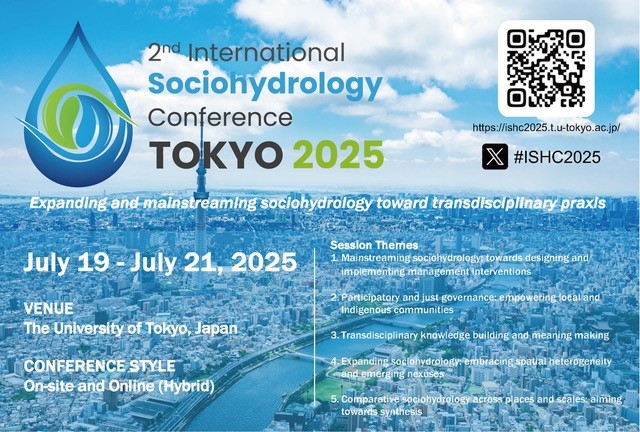
Important Dates
- Abstract Submission Deadline: 28 February 2025 at 09:00 GMT
- SYSTA Application Submission Deadline: 28 February 2025 at 09:00 GMT
- Registration Deadline: 30 April 2025.
SYSTA travel awards are available to eligible early career scientists who meet ALL of the SYSTA Award criteria. Applicants should email the completed application form and a copy of their published paper and conference abstract to IAHS Secretariat before the deadline of 28 February 2025 at 09:00 GMT. Before submitting their application form, applicants should read the “Guidance on completing the SYSTA application form” document. Applications and published paper must be in English. All eligible applications will be evaluated by the SYSTA committee after the deadline to decide on the awards.
The latest news from HSJ Digest
This first HSJ Digest of 2025 brings you all the articles published in recent issues of Hydrological Sciences Journal, including several Open Access and ‘Featured’ articles. We announce the winner of the 2024 Frances Watkins Memorial Award, and highlight news from our publisher, Taylor & Francis. We announce the launch of the official Hydrological Sciences Journal (HSJ) page on LinkedIn! Find out too about current Calls for Papers and, in our regular profile of key HSJ people, meet Co-editor Konstantinos Soulis.

Abstract Submission Deadline Extended
Preparation for the XIIth IAHS Scientific Assembly is continuing at full speed and the abstract submission deadline has been extended to 20 February 2025 due to popular demand!
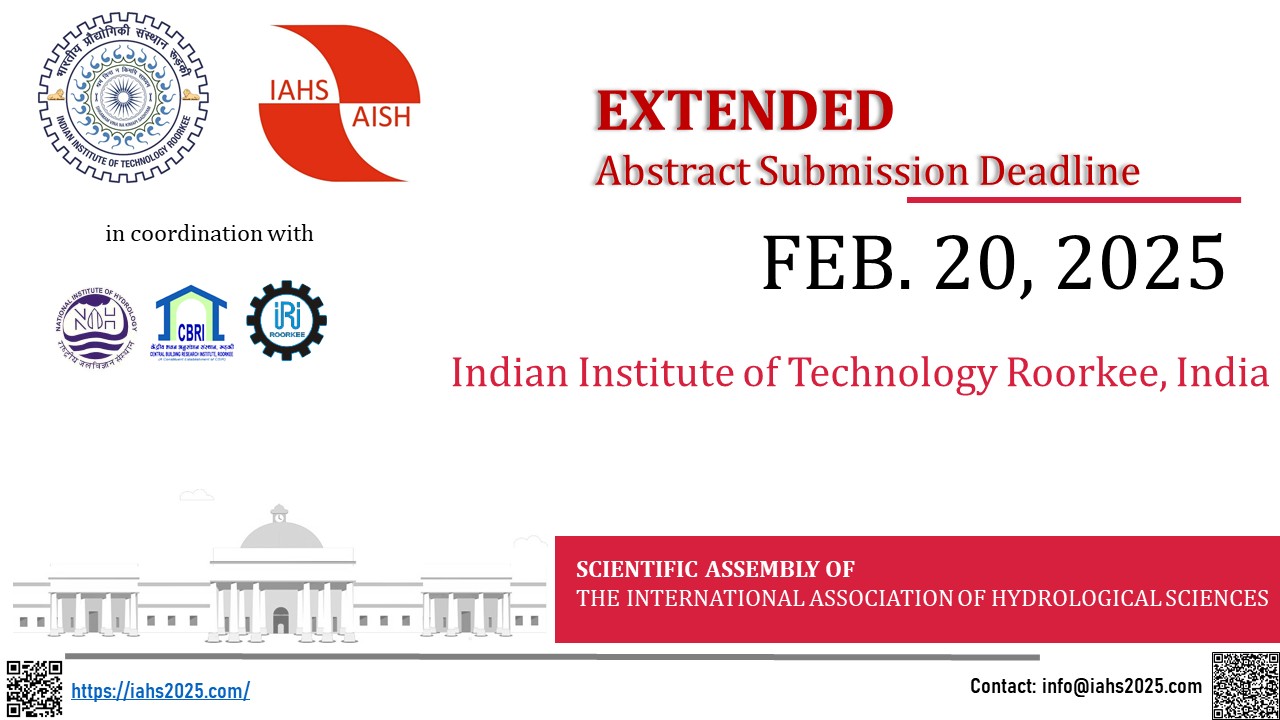
Early Career Travel Award - SYSTA
SYSTA awards are available to eligible early career scientists who meet ALL of the SYSTA Award criteria. Applicants should email the completed application form and a copy of their published paper and Scientific Assembly abstract to IAHS Secretariat before the deadline of 21 February 2025 at 09.00 GMT. Before submitting their application form, applicants should read the “Guidance on completing the SYSTA application form” document. Applications and published paper must be in English. All eligible applications will be evaluated by the SYSTA committee after the deadline to decide on the awards.
An innovative new format
The IAHS Scientific Assembly will be jointly organised by the Indian Institute of Technology Roorkee, in coordination with the National Institute of Hydrology Roorkee, Irrigation Research Institute Roorkee and CBRI–Central Building Research Institute (CBRI) Roorkee, four leading institutions in the field of water resources in India. The Assembly will experiment with an innovative new format aiming to underline the importance of the discipline of Hydrology and to increase the visibility of the next generation of hydrologists.
The first innovation
The Assembly will be held in plenary, without parallel sessions, thus increasing the interaction and audience size for all oral presentations. This choice is expected to produce more engaging presentations, to increase the visibility of the speakers and to increase the awareness that we are all part of the same discipline.
The second innovation
All participants will have an oral slot in the plenary. This choice will secure the visibility of early career scientists. In order to guarantee an oral slot for all participants, two contributions will be available: oral contribution (15 minutes duration), and forum contribution (1 minute duration). The forum contribution may be a plenary flash presentation, traditional poster or poster with video-interview. Authors that opt for the latter will be interviewed in front of their poster (3 minutes duration) and the video will be posted on the IAHS-YouTube channel.
The third innovation
Since the innovative format would like to emphasize that hydrology is a unique discipline, the third innovation is that there will not be a Call for Sessions. The scientific program of the IAHS Scientific Assembly will cover all the various scientific initiatives of IAHS:
- Continental Erosion (ICCE)
- Coupled Land-Atmosphere Systems (ICCLAS)
- Groundwater (ICGW)
- Human-Water Feedbacks (ICHWF)
- Remote Sensing (ICRS)
- Statistical Hydrology (ICSH)
- Snow and Ice Hydrology (ICSIH)
- Surface Water (ICSW)
- Tracers (ICT)
- Water Quality (ICWQ)
- Water Resource Systems (ICWRS)
- The Unsolved Problems in Hydrology – (23 sub-flags for selecting the specific question)
- Measurements and Observations in the XXI century (MOXXI)
- Citizen and Hydrology (CANDHY)
- History of Hydrology
- Global and local interactions (HELPING Theme 1)
- Holistic solutions for water security (HELPING Theme 2)
- Cross-Cutting Goals (HELPING Theme 3).
In addition to keynote speeches, technical presentations, and panel discussions, the conference includes field visits, workshops, and training programs. Instead of parallel meetings, we will have pre-event meetings as side events. Therefore interested leaders of International Commissions, Working Groups and Committee Leaders should reach out to the IAHS Secretariat or Secretary General as soon as possible so that facilities can be provided and participants can arrange their stay accordingly. Side event details will be posted on the IAHS2025 website as soon as they’re confirmed, so stay tuned!

Join us in India this October for what promises to be an engaging and transformative event for the hydrological sciences!
Abstract Submission for XIIth IAHS Scientific Assembly, 5-10 October 2025 is Now Open!
Early Career Travel Award - SYSTA
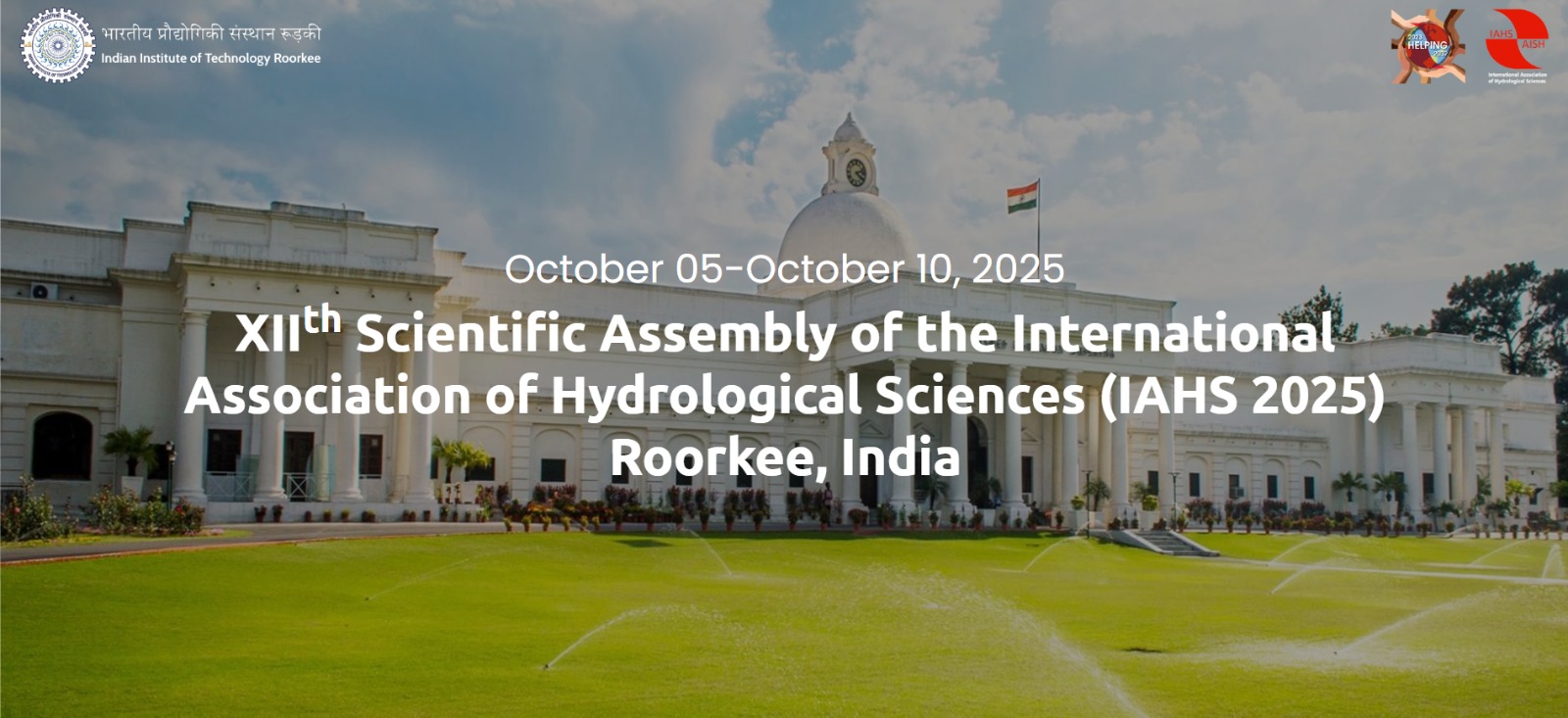
SYSTA travel awards are available to eligible early career scientists who meet ALL of the SYSTA Award criteria. Applicants should email the completed application form and a copy of their published paper and Scientific Assembly abstract to IAHS Secretariat as early as possible. Before submitting their application form, applicants should read the “Guidance on completing the SYSTA application form” document. Applications and published paper must be in English. All eligible applications will be evaluated by the SYSTA committee after the deadline to decide on the awards.
Important Dates
Abstract Deadline: January 30, 2025
Early-Bird Registration Start: February 15, 2025
Early-Bird Registration Close: April 15, 2025
SYSTA Deadline: February 21, 2025 at 09.00 GMT
Scientific Assembly: October 05-October 10, 2025
Re-cap of IAHS 2024
I hope this message finds you well as we start the beginning of a new year and appreciate the end of another remarkable year. It's been a journey filled with hard work, dedication, and significant accomplishments. As we bid farewell to 2024 and embrace the opportunities of the year ahead, let's take a moment to reflect on some of the remarkable successes we've achieved together.
January:
IAHS is associated with the 4th International Conference on Snow Hydrology in Grenoble, France.
HSJ calls for manuscript submissions for Karst hydrology, Emerging hydro-climatic dynamics and human–water interactions in a changing world, and Twenty-first century hydrological challenges and opportunities in Africa.
HSJ, Vol 69, Issue 1 is published.
February:
HSJ, Vol 69, Issue 2 is published.
History of Hydrology Working Group launches History of Hydrology Interviews on YouTube.
March:
IAHS organises a side-event on HELPING and participated in Roorkee Water Conclave, India.
IAHS celebrates World Water Day 2024: 'Leveraging Water for Peace', in collaboration with the Birmingham Water Research Centre online events such as presenting the HELPING decade.
HSJ, Vol 69, Issues 3 and 4 are published.
The IAHS Digital Water Globe editorial team is created.
April:
IAHS organises splinter meetings on the IAHS Digital Water Globe at EGU 2024.
HSJ, Vol 69, Issues 5 and 6 are published.
IAHS organises sessions and splinter meetings on HELPING at EGU 2024.
ICT and ICHWF host splinter meetings at EGU 2024.
Africa Regional Committee, Early Career Committee (ECC) and History of Hydrology Working Group host splinter meetings at EGU 2024.
May:
HSJ, Vol 69, Issues 7 and 8 are published.
PIAHS, Vol 385, IAHS2022 – Hydrological sciences in the Anthropocene is published.
Early Career Committee (ECC) introduces a blog series.
June:
IAHS is represented in AOGS 2024 in Gangwon-do, Korea.
Early Career Committee (ECC) hosts splinter meetings at AOGS 2024 in Gangwon-do, Korea.
HSJ, Vol 69, Issue 9 is published.
IAHS President, Berit Arheimer, and other IAHS members attend the 26th Session of the Intergovernmental Council of the Intergovernmental Hydrological Programme in UNESCO Headquarters, Paris, France.
July:
The IAHS Digital Water Globe is quoted in UNESCO Open Hydrology.
IAHS co-organised Summer School: Runoff Predictions in Ungauged Basins (PUB) in Vienna, Austria.
ICCE host Symposium 2024 in Eichstatt-Ingolstadt, Germany.
IAHS SYSTA travel awards were made for the ICCE Symposium 2024 in Eichstatt-Ingolstadt, Germany.
HSJ, Vol 69, Issue 10 is published.
August:
HELPING Opinion Paper is published in HSJ.
HSJ, Vol 69, Issues 11 and 12 are published.
PIAHS, Vol 386, ICFM9 – River Basin Disaster Resilience and Sustainability by All is published.
September:
Martin Addi of Ghana wins the IAHS Tison Award for an outstanding paper published by IAHS in the HSJ.
IAHS co-organises the 15th Annual Catchment Science Summer School in Birmingham, England.
IAHS presents the HELPING initiative at the Penman lecture of the British Hydrological Society in Oxford, England.
HSJ, Vol 69, Issues 13 and 14 are published.
ICT establishes the Tracer Application on Noble Gas Nuclides, TANGR meeting as an IAHS-ICT series meeting.
ICWRS publishes a paper "Historical synthesis of the International Commission on Water Resources Systems" in HSJ.
ICHWF hosts Topical workshop on Drought by DitA group in Geneva, and publishes a paper on “Drought as a Continuum” in NHESS in the Drought, society & ecosystem special issue.
October:
Archana Sarkar, IAHS Vice-President, is appointed as Chair for the IAHS EDI Task Force.
IAHS takes part in 25th WaterNet/WARFSA/GWP-SA Symposium Maseru, Lesotho.
HELPING Working Group "REHYDRATE" hosts online workshops.
HSJ, Vol 69, Issues 15 and 16 are published.
HELPING Working Group "Drought in the Anthropocene" organises the scientific contribution to the Drought Resilience meeting on national drought policy, and co created recommendations for drought action for the upcoming decade.
HELPING Working "Group Acceptance of Nature-based solutions" organises the 2024 Yellow River Ecohydrology Forum.
November:
Joint conference between IAHS International Commissions and IAHS Latin America Committee at the 9th IWRM / 14th STAHY / 1st EBHE Conference in Florianópolis, Brazil.
The following awards and medals were presented at the official ceremony in Florianópolis, Brazil, in November: Dooge Medal is awarded to Prof. Lena Merete Tallaksen, the Volker Medal is awarded to Dr. Heidi Kreibich, and the 2024 IAHS Falkenmark Award is awarded to Dr Djim Diongue.
IAHS SYSTA travel awards were made for the 9th IWRM / 14th STAHY / 1st EBHE conference in Florianópolis, Brazil.
6th ICWQ Workshop 2024 in Guangzhou, China.
IAHS members attended the Irish National Hydrology Conference 2024 in Athlone, Ireland.
HELPING Online Conference 2024.
ICSW publishes a paper "Seven strategies to leverage water for peace and foster sustainable and just water management for all" in Nature Water.
PIAHS, Vol 387, Mountain Hydrology and Cryosphere is published.
December:
Introducing the new HELPING Chair: Prof Thom Bogaard.
The IAHS Frances Watkins Memorial Award for 2024 is awarded to John R. Nimmo for his HSJ article entitled New insights on the origin of the Richardson-Richards equation.
HELPING Working Group "Acceptance of Nature-based solutions" organises the 7th International EcoSummit with the theme "Eco-civilization for a Sustainable and Desirable Future." This is one of the premier conferences in the field of ecology, held every four years.
HELPING Working Group "Stepwise Ecological Restoration of Watersheds" organises the Global Partnership for Ecosystem Services (ESP) Asia Training Series: Integrated Ecosystem Services Assessment, and authored a monograph entitled "Theory and Application of Ecological Restoration" (in Chinese), constructed a theoretical framework of stepwise ecological restoration and promoted it.
HELPING Working Group "Hydrologic Design: Solutions and Communications" publishes paper in HSJ.
The past year has been nothing short of extraordinary for IAHS, and it's all thanks to your unwavering commitment. Looking ahead, 2025 promises new challenges and opportunities. I am confident that, with your enthusiasm and expertise, we will achieve even greater heights.
As we bid farewell to 2024 and look forward to the opportunities that await us in the coming year, I want to convey a simple yet profound message to each and every one of you. Your passion, expertise, and collaborative spirit are the driving forces behind our success.
Warm regards
Jean-Marie Kileshye Onema
IAHS Secretary General
Abstract Submission for 2nd International Sociohydrology Conference, 19-21 July 2025 is Now Open!
The 2nd International Sociohydrology Conference, co-organised by the IAHS Human-Water Feedbacks Commission, will be held from July 19 to 21, 2025, in Tokyo, marking its first appearance in Asia.

Under the theme of “Expanding and Mainstreaming Sociohydrology toward Transdisciplinary Praxis,” the conference will gather researchers and practitioners from around the world to explore innovative approaches for bridging science and practice in water-related fields. Central to this conference will be discussions on:
1) mainstreaming sociohydrology by designing and implementing effective management interventions,
2) participatory and just governance to empower local communities,
3) pluralising water knowledge for inclusive water governance,
4) expanding sociohydrology to understand spatial heterogeneity, and
5) comparative sociohydrology across places and scales aiming towards synthesis.
Important Dates
SYSTA Abstract Submission Deadline: 28 February 2025 at 09:00 GMT
Abstract Submission Deadline: 28 February 2025 at 09:00 GMT
Registration Deadline: 30 April 2025.
SYSTA travel awards are available to eligible early career scientists who meet ALL of the SYSTA Award criteria. Applicants should email the completed application form and a copy of their published paper and conference abstract to IAHS Secretariat as early as possible. Before submitting their application form, applicants should read the “Guidance on completing the SYSTA application form” document. Applications and published paper must be in English. All eligible applications will be evaluated by the SYSTA committee after the deadline to decide on the awards.
HSJ volume 70 personal subscriptions now due
HYDROLOGICAL SCIENCES JOURNAL
Editor in Chief: Attilio Castellarin
Co-Editors: Stacey Archfield, Aldo Fiori, Konstantinos Soulis, and Riddhi Singh.
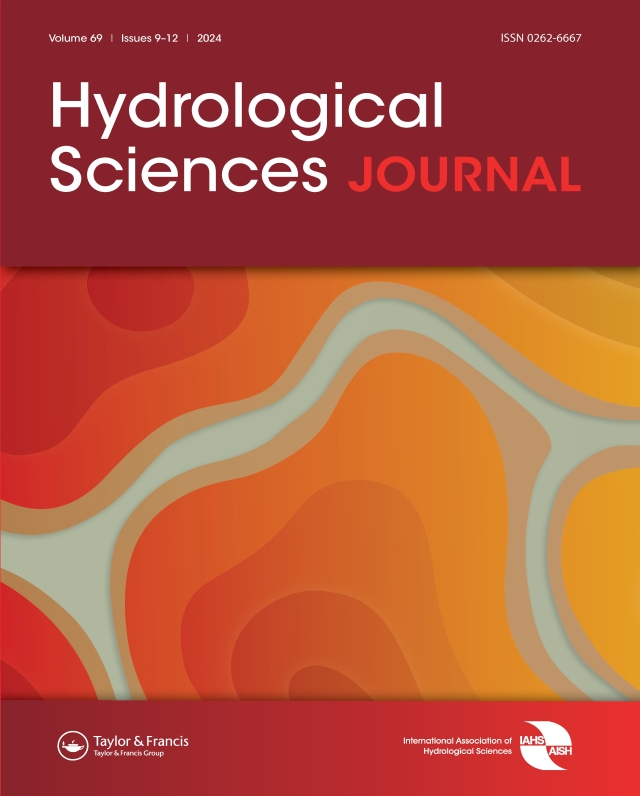
Hydrological Sciences Journal provides a forum for original papers and discussion of significant developments in hydrological science and practice, and related disciplines.
Online access to papers in the two most recent volumes of HSJ is by library/personal subscription; all earlier volumes are available open access. The latest articles including accepted author versions are published online prior to being assigned to an issue and may be cited using the DOI.
Q1 CiteScore Best Quartile; 6.6 CiteScore (Scopus); 2.8 IF; 3.9 5-year IF (2023 Journal Citation Reports).
Special journal subscription rates are available to IAHS Members: £27.00 for a personal online subscription, and £48.00 for a personal online + print subscription. IAHS Members should order by contacting [email protected]. Institutions and libraries should order direct from Taylor & Francis or their usual agent.
IAHS members from the following countries are eligible for 80% discount on book prices, subject to the minimum price restriction, and free online access to HSJ via the IAHS website:
Afghanistan, Albania, Algeria, Angola, Armenia, Azerbaijan, Bangladesh, Belarus, Belize, Benin, Bhutan, Bolivia, Bosnia and Herzegovina, Botswana, Brazil, Burkina Faso, Burundi, Cabo Verde, Cambodia, Cameroon, Central African Republic, Chad, Colombia, Comoros, Congo, Côte d'Ivoire, Democratic People's Republic of Korea, Democratic Republic of the Congo, Djibouti, Dominica, Ecuador, Egypt, El Salvador, Equatorial Guinea, Eritrea, Ethiopia, Fiji, Gabon, Gambia, Georgia, Ghana, Grenada, Guatemala, Guinea, Guinea-Bissau, Haiti, Honduras, India, Indonesia, Iraq, Iran, Islamic Republic of, Jamaica, Jordan, Kenya, Kingdom of Eswatini, Kiribati, Kosovo, Kyrgyzstan, Lao People's Democratic Republic, Lebanon, Lesotho, Liberia, Libya, Madagascar, Malawi, Mali, Marshall Islands, Mauritania, Mauritius, Micronesia (Federated States of), Moldova, Mongolia, Morocco, Mozambique, Myanmar, Namibia, Nepal, Nicaragua, Niger, Nigeria, North Macedonia, Pakistan, Papua New Guinea, Paraguay, Peru, Philippines, Rwanda, Saint Vincent and the Grenadines, Samoa, Sao Tome and Principe, Senegal, Serbia, Sierra Leone, Solomon Islands, Somalia, South Africa, South Sudan, Sri Lanka, State of Palestine, Sudan, Suriname, Syrian Arab Republic, Tajikistan, Tanzania, Thailand, Timor-Leste, Togo, Tonga, Tunisia, Tuvalu, Uganda, Ukraine, Uzbekistan, Vanuatu, Venezuela, Viet Nam, Yemen, Zambia, Zimbabwe
List of eligible countries with the 60% lowest GDP per capita of all countries of the world (UN data, 2022).
In Memory of John Rodda
It is with great sadness that we report the recent death of John Rodda, longtime friend of IAHS and a key figure in its history. Our heartfelt condolences go out to his family, friends and colleagues.
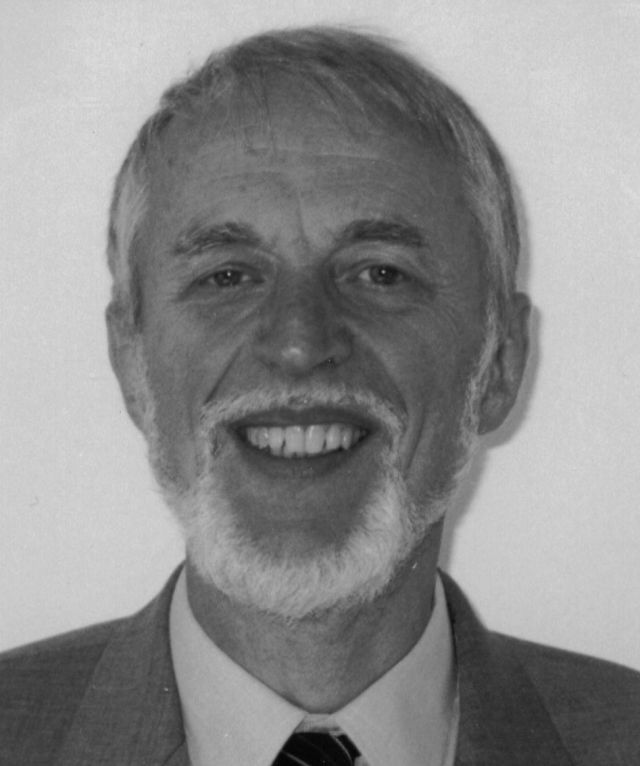
John’s academic career was forged in his native Wales. Still in Wales in the 1960s, his studies of headwaters led to the establishment of the famous catchment research programme at Plynlimon. John went on in the 1960s and 1970s to develop the pit rain gauge, widely accepted as superior to the standard used in most countries. In 1985 he was instrumental in convening the first of a series of conferences on the hydrological applications of weather radar. He took the initiative to establish links between catchment research being undertaken in various European countries, which eventually developed into the worldwide UNESCO FRIEND programme.
From the 1960s to the1980s John worked in research and development at the Institute of Hydrology in Wallingford, UK, the Department of the Environment in London and the Water Data Unit in Reading; from 1988 to 1995 he was Director of the Hydrology and Water Resources Department at the WMO in Geneva.
Throughout his career John was committed to IAHS: he was Chair of its Precipitation Committee from 1967 to 1971, Editor of HSJ from 1971 to 1979, Secretary General from 1979 to 1987 and President from 1995 to 2001, past-President until 2003. It was in 1971 that he opened the IAHS Press offices in Wallingford, UK to produce both the Journal and the IAHS book series.
His achievements were recognised with the IAHS-UNESCO-WMO International Hydrology Prize in 2004.
To hear more about his extraordinary life and work, you can watch his interview with Keith Beven on the History of Hydrology series on YouTube.
We remember John Rodda as a visionary and a great man whose work will live on in the scientific community and beyond. He will be deeply missed.
Show Appreciation of your Peers and Mentors
Please be reminded that nominations the 2025 International Hydrology Prize, the Tison Award, and the Falkenmark Award close on 31 December 2024. We would like to take this opportunity to highlight that anyone can prepare a nomination and encourage any National Representative to submit it officially. It is not limited to the representative of the nominee’s country.

The International Hydrology Prize (Dooge Medal and Volker Medal)
This is awarded by IAHS, with UNESCO and WMO, to two people who have made an outstanding contribution to hydrological science. Two medals are awarded under the International Hydrology Prize: the Dooge Medal and the Volker Medal. Both medals are intended to distinguish outstanding achievements by hydrological scientists but with a different focus. The Dooge medal is aimed at fundamental contributions to the science of hydrology, whereas the Volker medal is aimed at outstanding applications of hydrological science for the benefit of society at large.
The Tison and Falkenmark Awards
The Tison Award is granted for an outstanding paper published by IAHS in a period of two years prior to the deadline for nominations. The Falkenmark Award is for best PhD thesis from a nominee who grew up in and recently performed the PhD work in one or more financially disadvantaged countries.
More Information
More detailed information on each prize, the nomination process, eligibility, specific considerations, past winners, etc. can be found here.
Closing Date
Nominations for all of the awards must be received by the Secretary General, Jean-Marie Kileshye Onema at [email protected], no later than 31 December 2024.
Abstract Submission for XIIth IAHS Scientific Assembly, 5-10 October 2025 is Now Open!
Preparation for the XIIth IAHS Scientific Assembly, 5-10 October 2025 is continuing at full speed and abstract submission is now open.

Early Career Travel Award - SYSTA
SYSTA awards are available to eligible early career scientists who meet ALL of the SYSTA Award criteria. Applicants should email the completed application form and a copy of their published paper and Scientific Assembly abstract to IAHS Secretariat as early as possible. Before submitting their application form, applicants should read the “Guidance on completing the SYSTA application form” document. Applications and published paper must be in English. All eligible applications will be evaluated by the SYSTA committee after the deadline to decide on the awards.
New program format for the IAHS Scientific Assembly
As mentioned in a previous enews, the IAHS Scientific Assembly will experiment with an innovative format:
- The main innovation is that the Assembly will be held in plenary, without parallel sessions, thus increasing the interaction and audience size for all oral presentations.
- The second innovation is that all participants will have an oral slot in the plenary. This choice will secure the visibility of early career scientists.
- Since the innovative format would like to emphasize that hydrology is a unique discipline, the third main innovation is that there will not be a Call for Sessions. Instead there is an opportunity for pre-events.
Side events are also planned. Interested leaders of International Commissions, Working Groups and Committee Leaders should reach out to the IAHS Secretariat or Secretary General as soon as possible so that facilities can be provided and participants can arrange their stay accordingly. Side event details will be posted on the IAHS2025 website as soon as they’re confirmed, so stay tuned!
Join us in India next year for what promises to be an engaging and transformative event for the hydrological sciences!


